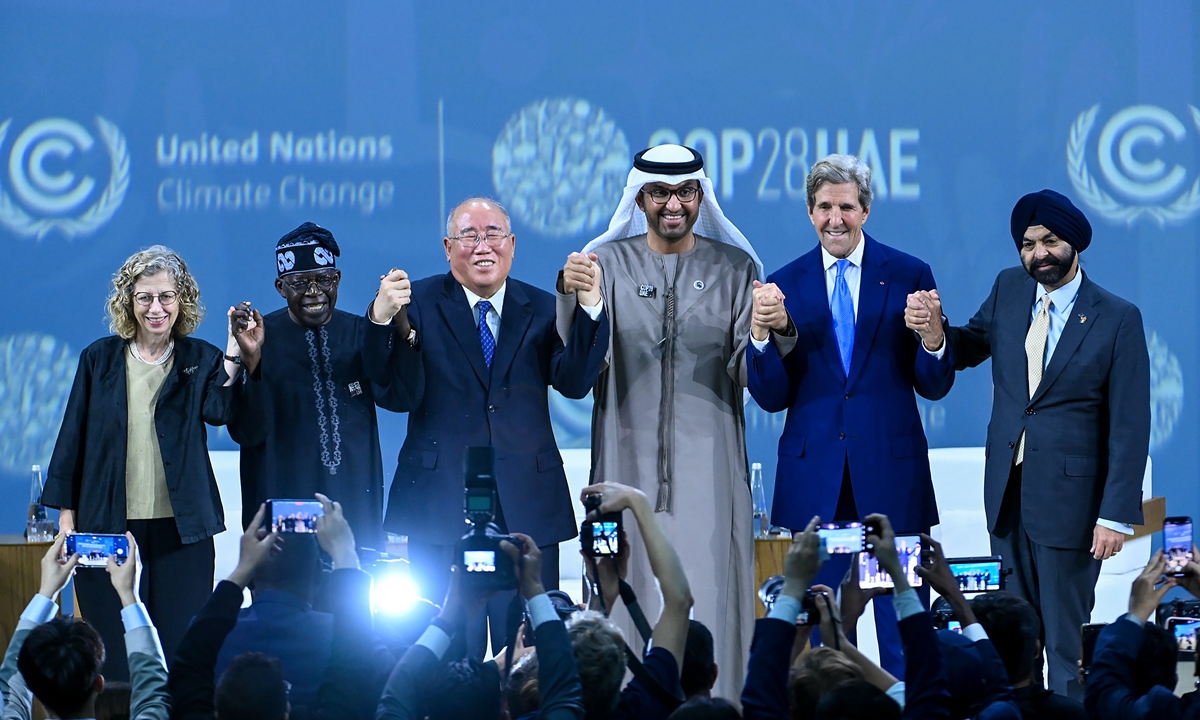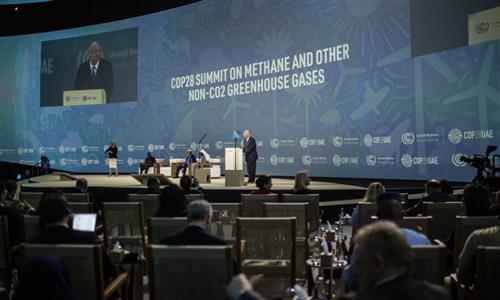Chinese climate envoy calls for intl effort in curbing methane emissions
China, US cooperation on cutting greenhouse gases one of the biggest highlight at COP28

COP28 President Dr. Sultan Ahmed Al Jaber (center) is flanked by China's special envoy for climate change Xie Zhenhua (third from left) and Special Presidential Envoy for Climate John Kerry (second from right) at the Energy Session at Al Waha Theater during day two of the high-level segment of COP28 at Expo City, Dubai on December 2, 2023. Photo: VCG
China's climate envoy Xie Zhenhua emphasized the urgent need for international cooperation to enhance methane control in developing countries and urged global unity and action during the 28th Conference of the Parties to the UN Framework Convention on Climate Change (COP28) on Saturday, together with US Special Presidential Envoy for Climate John Kerry.
Chinese experts hailed the agreement on reducing methane emissions between China and the US as marking one of the greatest highlights of COP28, which will buy valuable time for the international community to reduce greenhouse gas emissions.
Xie, China's special envoy for climate change, addressed the summit on the issue of methane and non-carbon dioxide (CO2) greenhouse gases at COP28 in Dubai on Saturday. The event was attended by figures like Kerry and Dr. Sultan Ahmed Al Jaber, COP28 President and Minister of Industry and Advanced Technology of the UAE, among other global leaders.
Xie delineated China's efforts and successes in controlling methane emissions. With a sequence of policies and programs in recent years, China has made progress in reducing methane and other non-CO2 emissions. Initiatives in the energy sector to curtail methane emissions from energy production, encourage methane recovery and reuse, and in the agricultural sector to promote the recycling of livestock and poultry waste and zero growth action for fertilizers have been pivotal.
Xie acknowledged the challenges that developing countries, including China, are facing in controlling emissions of methane and other non-CO2 greenhouse gases.
"China is still a developing country and faces a series of severe difficulties and risks in controlling emissions of methane and other non-CO2 greenhouse gases," he emphasized, adding that "China's work on methane emissions control started late and has a weak foundation. The data is unclear, and there are insufficient statistical accounting and monitoring capabilities, an imperfect regulatory, standard, and policy system, and an urgent need for improvement in technical and management capacities."
"The task of controlling methane and other non-CO2 gases in China is not easy and cannot be achieved overnight. It requires long-term arduous efforts, extensive foundational work, and capacity building," he noted.
"I believe that many developing countries are in the same situation as us. We are willing to act, but our capabilities are lacking, and we need to continue to work hard and strengthen this area through international cooperation," he said.
In November, the Chinese government released an action plan for methane emissions control. Xie said that China will transform the institutional design and task requirements of the methane plan into substantive, continuously strengthening foundational capabilities. "Meanwhile, we will properly handle the relationship between methane control and energy security, food security, industrial chain, supply chain security, and ensuring the well-being of the people," he said.
"We understand it's important for us to be able to find cooperation [between China and the US] here. No one country, no business anywhere in the world will solve this problem by itself. It will take the essence of multilateralism and global cooperation to be able to make this happen," said Kerry, noting that reducing methane emissions by at least 30 percent in 2030 is in line with the global methane pledge, which is to avoid over 0.2 C of warming by 2050.
Kerry continued that every expert agrees that dealing with methane, which is 80 to 100 times more destructive than CO2, rather than dealing with it later is critical to the world's ability to hold onto the 1.5 C benchmark.
Step by step
Last month, China and the US issued the Sunnylands Statement on Enhancing Cooperation to Address the Climate Crisis, which stated China's and the US' reaffirmation of their commitment to work together with other countries to address the climate crisis, with a working group to be operationalized to focus on areas including energy transition, methane, the circular economy and resource efficiency, low-carbon and deforestation.
During COP28, Xie and Kerry will try to map out more detailed plans about how to carry out more pragmatic and broader cooperation on reducing methane emissions and on other climate change cooperation issues, Ma Jun, director of the Beijing-based Institute of Public and Environmental Affairs, who is also attending COP28 in Dubai, told the Global Times.
Ma hailed that China and the US reaching agreement on reducing methane emissions can be seen as a substantial achievement of this year's COP, and this cooperation will win valuable time for international community to reduce greenhouse emissions.
Global emissions of carbon dioxide are still rising, thus tackling methane, which although it has a shorter lifetime in the atmosphere, it is more potent than carbon dioxide at trapping heat, can be an alternative effective way of reducing greenhouse emissions, Ma said.
After China released its action plan for methane emissions control, some foreign media, such as Bloomberg, cast doubts on the plan, saying it lacks an overall target or a date to cut emissions.
Bao Cunkuan, a professor of the Department of Environmental Sciences and Engineering at Fudan University, told the Global Times that the action plan is just China's initial step toward reducing methane emissions. "Before a clear roadmap, we need to get the basic picture of methane emissions in this country. That's why we need to make progress on methane emissions statistical accounting, monitoring and supervision, as outlined by the action plan."
Ma noted that China can also draw experience in cooperating with the US on tackling methane emissions, as the US started actions on curbing methane earlier than China.

